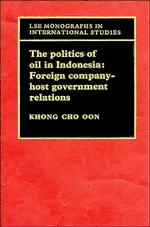Book contents
- Frontmatter
- Contents
- List of figures
- Acknowledgments
- 1 THE IMPACT OF THE FOREIGN COMPANY ON GOVERNMENT POLICIES IN LESS-DEVELOPED COUNTRIES
- 2 THE INDONESIAN PETROLEUM INDUSTRY: FORM AND CONTENT OF AGREEMENTS
- 3 FINANCIAL PROVISIONS AND CONSEQUENT AREAS OF DISPUTE
- 4 PROVISIONS FOR DEVELOPMENT AND NATIONAL CONTROL
- 5 PROBLEMS OF NEGOTIATION AND CONTRACTUAL CHANGE
- 6 ORGANISATIONAL STRUCTURE AND THE NEGOTIATING PROCESS
- 7 SOME REGIONAL CONSIDERATIONS FOR SOUTHEAST-ASIAN OIL-PRODUCER GOVERNMENTS
- 8 THE VIABILITY OF TRANSNATIONAL MINERAL AGREEMENTS
- Notes
- Select bibliography
- Index
5 - PROBLEMS OF NEGOTIATION AND CONTRACTUAL CHANGE
Published online by Cambridge University Press: 05 November 2011
- Frontmatter
- Contents
- List of figures
- Acknowledgments
- 1 THE IMPACT OF THE FOREIGN COMPANY ON GOVERNMENT POLICIES IN LESS-DEVELOPED COUNTRIES
- 2 THE INDONESIAN PETROLEUM INDUSTRY: FORM AND CONTENT OF AGREEMENTS
- 3 FINANCIAL PROVISIONS AND CONSEQUENT AREAS OF DISPUTE
- 4 PROVISIONS FOR DEVELOPMENT AND NATIONAL CONTROL
- 5 PROBLEMS OF NEGOTIATION AND CONTRACTUAL CHANGE
- 6 ORGANISATIONAL STRUCTURE AND THE NEGOTIATING PROCESS
- 7 SOME REGIONAL CONSIDERATIONS FOR SOUTHEAST-ASIAN OIL-PRODUCER GOVERNMENTS
- 8 THE VIABILITY OF TRANSNATIONAL MINERAL AGREEMENTS
- Notes
- Select bibliography
- Index
Summary
DISPUTE SETTLEMENT WITHIN AN EVOLVING PROCESS OF CONTRACT RELATIONS
After having examined the division of financial benefits within Indonesian oil contracts, their development provisions and the authority which the government attempts to assert over the extractive process, it has still to be asked how valid these terms are likely to remain. It is therefore important in examining the formal contract to assess how both parties are likely to respond to its terms over the long run, how adherence to existing terms can be maintained, and what is likely to lead to changes in the contractual relationship. Such issues of contractual change and negotiation are addressed in this chapter.
If the negotiating framework surrounding the petroleum-extractive operation is regarded as part of a dynamic process, in which a changing pattern of government–company relations gives rise to shifts in the bargaining positions of both sides, it would then seem inevitable that dissatisfaction over the governing set of contract terms will arise. Pressure for an improvement of terms from governments keen to maximise their returns from oil extraction has resulted not only from the extensive changes over the long term in the global environment of the international oil industry; nor can it be ascribed solely to any specific local development which might have strengthened the host government's bargaining hand. Quite apart from these factors, pressure for change is inherent in the nature and development of the extractive operation as it moves from one stage of activity to another.
- Type
- Chapter
- Information
- The Politics of Oil in IndonesiaForeign Company-Host Government Relations, pp. 129 - 158Publisher: Cambridge University PressPrint publication year: 1986



